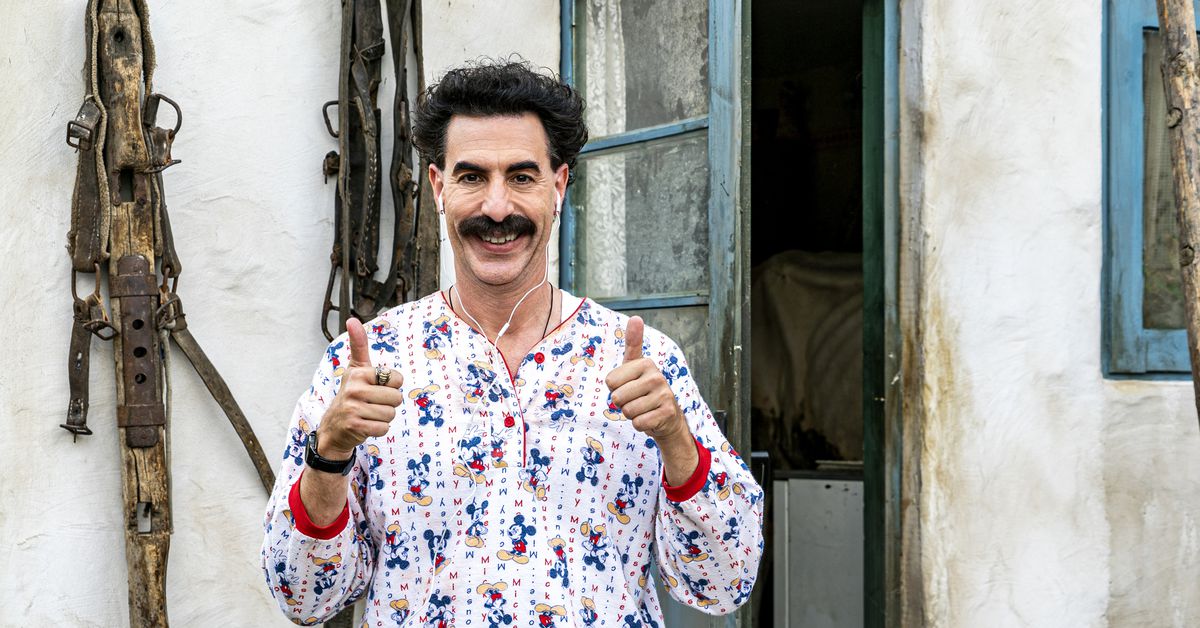
It’s dark and outrageous, but also surprisingly optimistic
A few months ago, the idea of a Borat sequel releasing days before America’s presidential election seemed unthinkable. High-profile projects created in secret, like Beyoncé’s 2013 self-titled album, don’t usually involve unscripted scenarios in full view of an unsuspecting public, let alone in view of public figures. Then again, 2020 has hardly been the realm of the expected.
The original 2006 Borat felt like the last great comedy film to permeate the broader culture. Borat Sagdiyev — a fictitious Kazakh reporter who British comedian Sacha Baron Cohen used to trap interviewees into letting their guards down — became globally recognizable and instantly quotable, a status only Marvel characters seem to achieve nowadays. The film’s follow-up, now streaming on Amazon Prime, likely won’t have the same staying power. Movie-watching is more splintered than it once was, and the sequel just doesn’t have the first film’s novelty, which allowed some of its lines and moments to become iconic to the point of oversaturation.
That said, Borat Subsequent Moviefilm: Delivery of Prodigious Bribe to American Regime for Make Benefit Once Glorious Nation of Kazakhstan is also one of the most uproariously funny American comedies in an ungodly long time. With an actress in tow playing Borat’s teenage daughter, Cohen makes his way back to a more turbulent U.S. for an even more outrageous film, one that not only embarrasses at least one major politician — “Great success!” — but manages to be surprisingly touching and optimistic along the way.
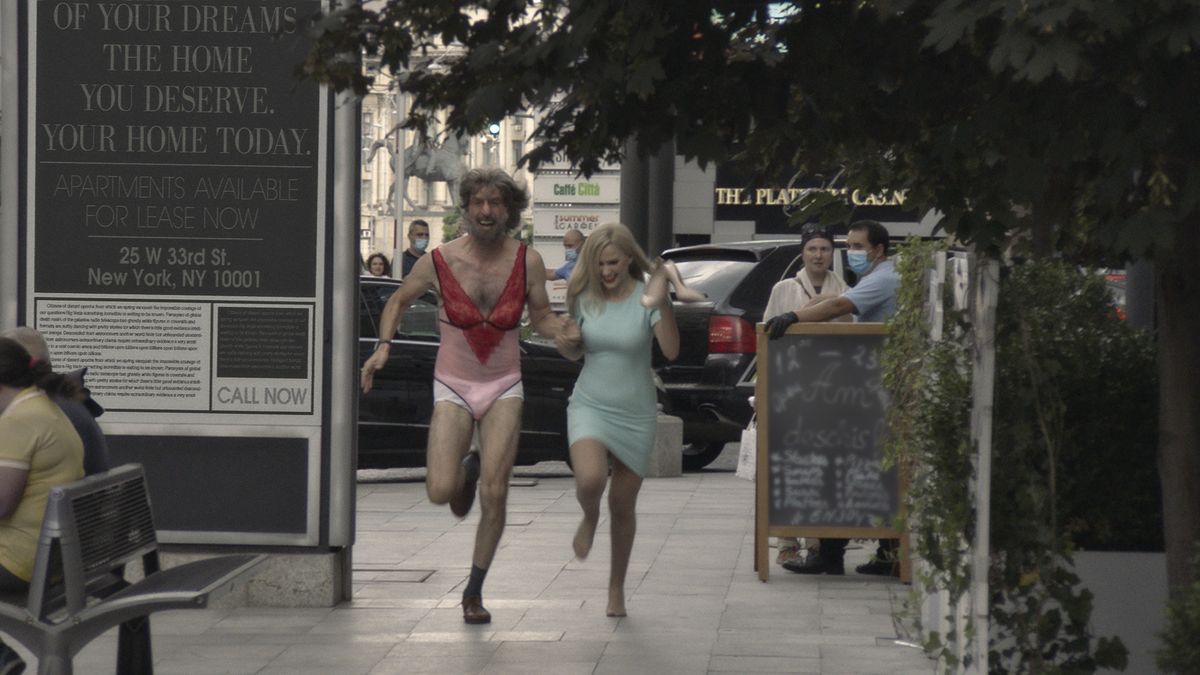
Photo: Amazon Studios
On its surface, it’s exactly what the first Borat conditioned Cohen fans to expect. It uses an American road trip as a pretext for ludicrous real-world interviews and improvised scenarios, where Cohen’s racist, sexist, anti-Semitic caricature pushes people’s buttons. And yet the results this time differ wildly, because the film takes a new approach to a wildly different America. Is it as good as the original? That’s hard to answer definitively, but the 2006 film is worth revisiting before watching the 2020 sequel (directed by Jason Woliner of Nathan For You), because it’s impossible for the two films not to be in conversation with each other.
Directed by Larry Charles, the original Borat — or Borat: Cultural Learnings of America for Make Benefit Glorious Nation of Kazakhstan — has a few segments that haven’t aged well, as expected from such a provocative film. At the time, Cohen had no singular target for his pranks, other than the broad strokes of “American culture.” However, in its totality, the landmark mockumentary holds up better than most comedies of its era. A re-watch might even reveal layers that some viewers might’ve missed. For instance, the scene where Borat attempts to make polite conversation at a fancy Mississippi dinner party takes place at an address on Secession Drive, while many of the curios he “accidentally” breaks at an antique store bear Confederate symbols.
These small details don’t change the meanings of the encounters — the unsuspecting old shopkeeper is still out about $400 after Borat’s clumsy mishap — but coupled with the specific nerves Cohen is prodding, they paint a clearer picture of the limits of American civility, which the film hoped to expose. The white dinner-party hosts put up with a hell of a lot, from Borat inadvertently insulting them to him retreating to the bathroom, then bringing his own poop back to the dinner table in a plastic bag. But the line they draw, instantly and collectively, is the presence of a Black sex worker, Luenell (one of the film’s only hired actors). The moment she shows up, the hosts’ patience goes straight out of the window. They even call the police.
The film’s key focus was what Americans were and were not willing to politely excuse. Borat celebrates the death of his wife Oxana and talks about killing Romani people with his car, and the folks around him largely go with the flow. Perhaps they don’t wish to be confrontational. But the question of what America would let slide in 2006 is ultimately relevant for what’s permissible in 2020.
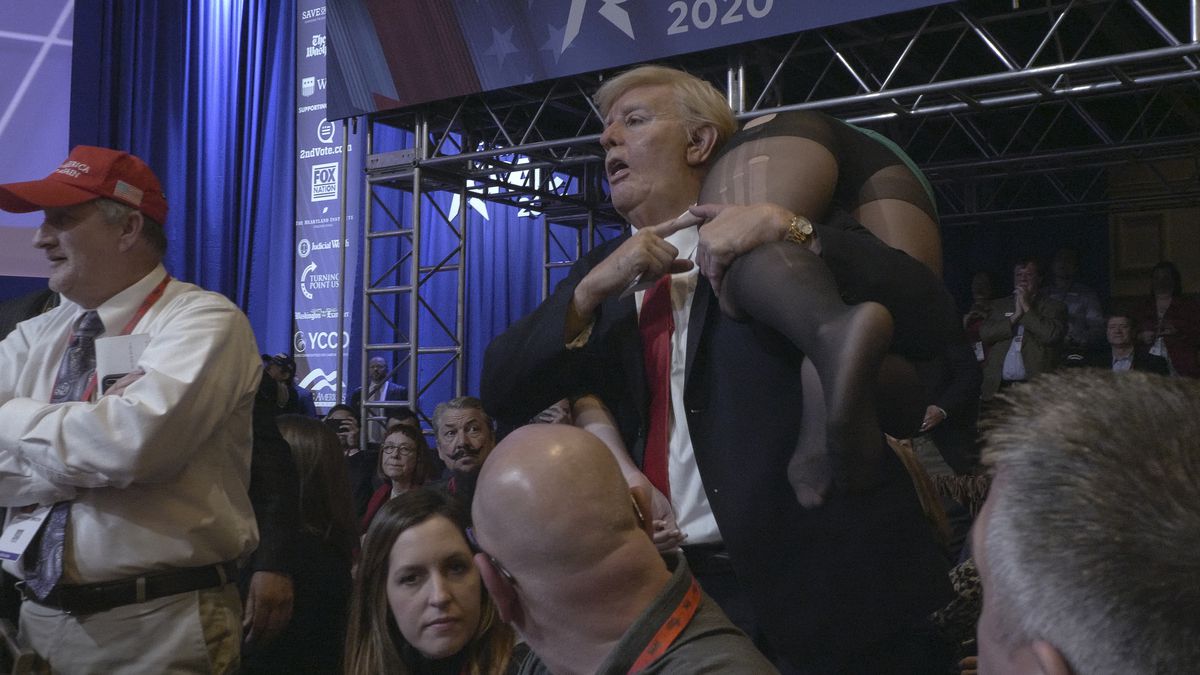
Photo: Amazon Studios
For every scene in the first Borat that hasn’t aged well — like Borat harassing random bystanders, or his overt misogyny toward a feminist group — there are just as many that have become even more chilling in light of America’s far-right pivot in recent years. A rodeo organizer breaks into an Islamophobic rant, and agrees with Borat (on camera, no less) that gay people should be executed, while the crowd cheers along when Borat talks about George W. Bush “[drinking] the blood of every single man, woman, and child in Iraq.” A group of drunk fraternity brothers who pick up Borat in their RV speak openly about their disdain for women and Jews, and express their desire to bring back slavery. The scene feels almost prophetic about the Trump era, and the way these ideas bled into mainstream discourse after being allowed to fester for so long.
The Borat of the Bush years perfectly mirrored the political moment. It was defined by a president whose public image was silly and oafish, while his crimes against humanity (during, say, the Iraq War) were things Americans often didn’t need to concern themselves with in their daily lives. Borat, like Bush, was a man of slip-ups and faux pas. But Borat Subsequent Moviefilm enters an America in which the frat brothers from the RV no longer feel like political outliers, so the material Cohen plays with is far more volatile.
This time, Borat’s journey isn’t about seeking out a bride, it’s about gifting his 15-year-old daughter Tutar (Maria Bakalova, who is incredible) to an American politician on behalf of the Kazakh government. He arrives in the America of Donald Trump, Jeffrey Epstein, and Roy Moore, an America in which Borat’s ploys need to be kicked up a notch to keep up with the changing political tides and the loosened limits of public acceptability. He ups the ante from inadvertent rudeness to outright child trafficking, just to see who’ll go along with it. The film may not show viewers anything they don’t already know about America’s political landscape — it’s hard to reveal hidden layers when racial and political vitriol are so out in the open — but Cohen and Bakalova’s antics are a riot regardless.
The Borat of 2020 is also the Borat of hypervisibility. He’s instantly recognizable in the internet age (a fact worked neatly into the sequel’s fiction), so the result is Cohen, dressed as Borat, having to further disguise himself as a litany of bearded American caricatures, occasionally shedding the reporter’s signature stilted gait. The film sometimes resembles Cohen’s 2018 Showtime series Who Is America? in that regard. But unlike the show, which had no consistent ideological target, the Borat sequel takes aim almost entirely at American conservatism. This includes its more conspiratorial strains, especially during the COVID-19 pandemic, which wasn’t part of the film’s original plan, but is no less worked into its story.
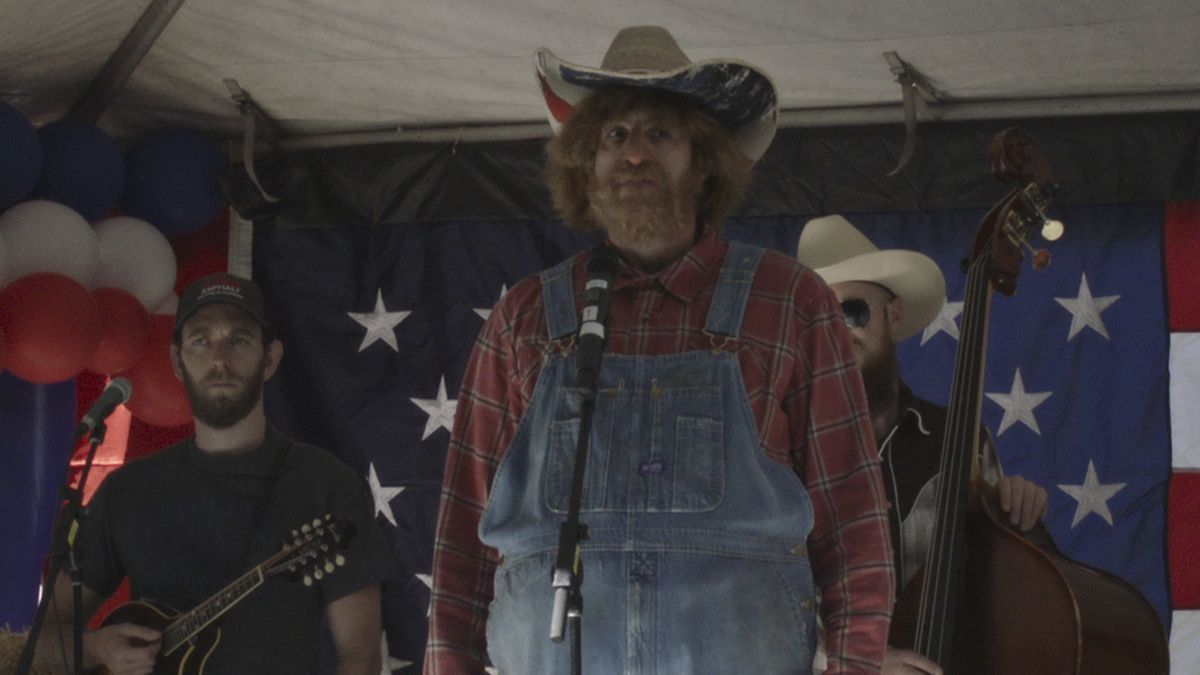
Photo: Amazon Studios
The sequel even one-ups its predecessor by using country music to expose conservative extremism. One high point for the Borat character came before the original movie: in a 2004 segment on Da Ali G Show, Cohen — an Ashkenazi Jew and the grandson of a Holocaust survivor — goads patrons at an Arizona country bar into singing along to the anti-Semitic lyrics of a song called “Throw the Jew Down The Well.” Of the segment, Cohen said he believed it exposed indifference to anti-Semitism rather than anti-Semitism itself, the kind of complicity he went on to explore in the first film. But when he reprises the character’s musical talents in the sequel, there’s no mistaking the gleefully violent intent behind what he gets an armed right-wing militia to sing along to: “Journalists! What we gonna do? Chop ’em up like the Saudis do.” Even in an era when people aren’t afraid to be downright vile on camera, the film is as enjoyably shocking today as its predecessor was in 2006.
The clip of Borat dressed as Donald Trump, interrupting Vice President Mike Pence during a CPAC speech, made the news back in February, but the sequence showing how Borat got into the building hasn’t been equally circulated. It’s one of several jaw-dropping moments that feels like a clear demarcation between this film and the original. (Without giving too much away, it involves a particularly racist outfit that would’ve gotten Cohen thrown out of most establishments prior to 2016.) People often say of older comedies, “There’s no way you could’ve made this today.” But some moments in Borat 2 are the opposite: They likely wouldn’t have been as openly permissible 14 years ago.
Rather than chipping away at polite layers to find latent prejudices, Borat’s grotesqueness is now an immediate green-light for people’s racism and misogyny. A particularly memorable example comes from an unscripted moment that echoes a famous line from the first film: “Very nice, how much?” Only instead of Borat soliciting an unsuspecting woman in a candid-camera segment, he’s finding instant camaraderie at a high-society debutante ball: With the cameras in full view, an older gentleman answers a similar question in relation to Borat’s daughter, agreeing on a price he would pay for the teenager, with only the slightest provocation. Whether he’s serious or simply humoring Borat, what makes the exchange even more appalling is that the gentleman doesn’t seem to mind his own daughter overhearing him.
Somehow, this is only the tip of the iceberg in terms of what improprieties people are willing to excuse or engage in. But while it may sound like the film is just an exhibition of bigotry, its beating heart is even bigger than last time.
In the first film, Borat introduced himself with the line “I like you. I like sex.” That’s pretty much all you need to know about his character; he’s sincere, and a bit of a pervert, which paints his journey to California with the right kind of cognitive dissonance for a raunchy comedy. Borat’s love for Pamela Anderson was, in his mind, real and true, but it was counterbalanced by a cartoonishly ugly misogyny. His audience doesn’t necessarily want him to succeed at kidnapping a celebrity, but watching the film also means being morbidly curious about the outcome. (It turns out Anderson was in on the joke, though it may have contributed to her divorce from Kid Rock!) The original is surprisingly enticing as a character piece, in large part due to Cohen’s vulnerable performance, which won him a Golden Globe. But the first Borat was also a solo journey, with heartfelt moments delivered mostly to camera. This new film, however, is about a father-daughter relationship.
It’s rife with fairy-tale imagery, from gowns to mirrors to an elaborate Disney-style cartoon about Melania Trump, which Tutar finds aspirational. Borat both sexualizing and infantilizing his daughter (and even Rapunzel-ing her with despotic parenting) makes the personal moments feel surreal at times, but they’re all grounded in a pair of unexpectedly moving performances. (When the lead duo aren’t tearing up the screen with their bacchanalian energy, that is.) The misogyny is even uglier and more cartoonish this time, though relative newcomer Bakalova being in on the joke — she’s as much a co-star as a co-conspirator — goes a long way toward expanding the scope of each encounter. Where Borat’s bigoted provocations were once merely words and ideas, they’re now put into action against a real human being, like when Borat and Tutar go shopping for a cage for her to sleep in. The things the film’s prank victims are willing to let slide this time feel all the more abhorrent.
But Borat 2 isn’t all doom and gloom. Its narrative through-line is surprisingly optimistic. Notably, a moment between Tutar and one subject of the film’s antics — an older Black woman, who could’ve so easily just been another bystander — ends up being a vital narrative lynchpin, thanks to an unscripted moment of kindness that sets the story on an unexpected path. Before long, it becomes about Tutar discovering her own independence and bodily autonomy, and Borat soon discovers it too.
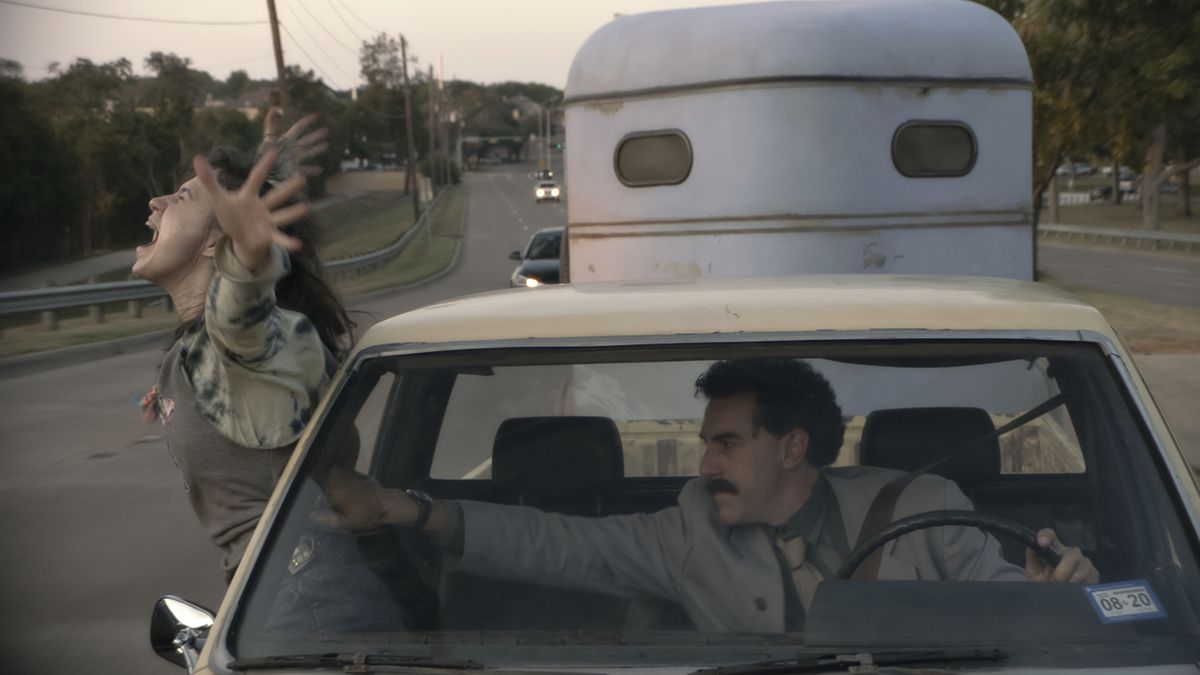
Photo: Amazon Studios
This review really could’ve been a typewriter screed à la The Shining with the words “FEMINIST BORAT! FEMINIST BORAT!” repeated a few hundred times. The idea is just so brain-breakingly silly on paper. It sounds like a bad joke, until the film’s genuinely human moments unfold on screen. And the way this particular subplot resolves overlaps with what might be an insurmountable high point in Cohen’s mock-interview oeuvre.
Rudy Giuliani’s unwitting involvement in the film has already been covered in news headlines, but watching it play out is really the best way to discover it. It’s a narrative high-wire act, in which Tutar, posing as a reporter, flirts with Giuliani as a matter of duty to her father, while Borat (disguised as her sound recordist) attempts to stop her. While the scene ends with the former Mayor and current Trump advisor reaching into his trousers, the buildup feels dangerous, like being on the verge of plummeting off a cliff. In these climactic scenes, the film rides the line between mockumentary and investigative sting operation, further exposing the moral rot surrounding this administration, as a man in power readily casts aside any ethical and professional judgement to take advantage of someone young and vulnerable. The fact that Cohen and Bakalova pulled it off feels like a heist. The fact that it was woven into a character-driven narrative feels like a goddamn miracle.
But perhaps the biggest heist of all is that Cohen and his cohorts have made Borat’s return to “U.S. and A.” feel effortless and exciting, long after he overstayed his cultural welcome. The character repeats all his memorable lines in the sequel’s opening scene just to get them out of the way, because it seems even Cohen is aware there’s no way he can top them. Instead, he makes the sequel’s gimmicks even more outrageous. But while they reveal a deeper moral decay in America than before, they also reveal an even deeper humanity. The father-daughter dynamic is surprisingly tender for a film this farcical. And where the first Borat used an older Jewish couple merely as a target of joking anti-Semitism (granted, the couple enjoyed the film!), the sequel centers the humanity of its Jewish subjects to a far greater degree, like when an older Jewish woman and Holocaust survivor diffuses Borat’s bigotry with an almost defiant act of compassion.
It sounds ridiculous to say, but the Borat sequel is about as optimistic as a film about the current political moment can be right now. Even though its lead characters are fraudulent pranksters, and their creator has a penchant for preying on politeness, the kindness people show Borat and Tutar is the furthest thing from manufactured. It’s a welcome respite from all the ugliness on display — and from the moments where the film might have viewers keeling over with laughter.
Borat Subsequent Moviefilm is now streaming on Amazon Prime.
